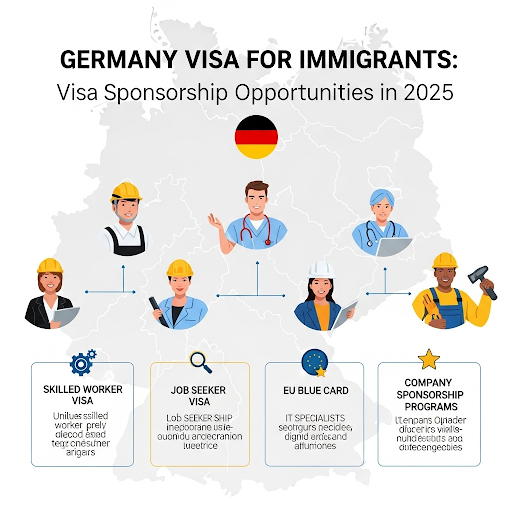Looking for visa-sponsored jobs in the UK in 2025? London is your top destination. As a global economic powerhouse, London contributes over £500 billion to the UK’s £3.1 trillion GDP, making it a magnet for international professionals across industries.
With critical labour shortages projected to exceed 1 million workers nationwide, London is facing an urgent need for foreign talent—especially in finance, tech, healthcare, engineering, and the creative sectors.
To fill these high-demand roles, UK employers are actively offering visa sponsorships for skilled candidates, with many jobs paying between £50,000 and £120,000 annually.
Whether you’re in software development, data analysis, nursing, project management, or design, the capital offers one of the most promising career landscapes in Europe, complete with access to the Skilled Worker Visa, Health and Care Worker Visa, and other legal immigration pathways.
This in-depth 2025 guide unpacks everything you need to know about working in London with visa sponsorship, including job types, average salaries, visa eligibility, required documents, application strategies, cost of living, relocation tips, and answers to the most frequently asked questions (FAQs). If you’re ready to take your career global, London could be your gateway to a high-income, visa-supported future.
Economic Context and Demand for Visa-Sponsored Workers
London’s economy, a cornerstone of the UK, is fueled by its status as a financial powerhouse, home to the City of London and Canary Wharf, alongside thriving tech startups in Shoreditch and healthcare innovations in the NHS.
The UK’s post-Brexit labor market, combined with an aging workforce (25% over 55), has led to a worker shortage exceeding 1 million, according to the Office for National Statistics (ONS).
In London, this gap is pronounced in high-skill sectors, where local talent struggles to meet demand due to skill mismatches and housing pressures.
The UK government’s immigration policies, including the Skilled Worker Visa and the Shortage Occupation List, have evolved to address this, with London employers increasingly sponsoring international talent.
The city’s multicultural fabric, with over 3 million foreign-born residents (37% of its population), supports integration, while its high cost of living—mitigated by substantial salaries—makes it a magnet for global professionals.
In 2025, the demand for sponsored roles paying £50,000–£120,000 reflects London’s need for expertise in finance, technology, healthcare, and engineering, offering a pathway for immigrants to thrive.
Job Opportunities with Visa Sponsorship
London offers a range of high-paying roles with visa sponsorship, targeting professionals with specialized skills. These positions, spanning multiple sectors, align with the UK’s labor shortages and employer willingness to support international hires. Below are key job categories, responsibilities, salary ranges, and demand drivers:
Finance and Banking
- Roles: Investment Analyst, Financial Advisor, Risk Manager
- Salary Range: £60,000 – £120,000 annually
- Responsibilities: Analyze market trends, advise clients, and manage financial risks for institutions like Barclays or HSBC.
- Demand Drivers: London’s status as a global financial center, with a need for expertise post-Brexit.
- Sponsorship: Common from major banks and fintech firms.
Technology and IT
- Roles: Software Engineer, Data Scientist, Cybersecurity Specialist
- Salary Range: £55,000 – £110,000 annually
- Responsibilities: Develop software, analyze data, or secure systems for companies like Google or Tech City startups.
- Demand Drivers: Rapid digital transformation and a 15% projected tech job growth by 2030.
- Sponsorship: Widespread among tech giants and innovative SMEs.
Healthcare
- Roles: Consultant Doctor, Specialist Nurse, Physiotherapist
- Salary Range: £50,000 – £100,000 annually
- Responsibilities: Provide medical care, specialize in areas like pediatrics, or rehabilitate patients in NHS trusts.
- Demand Drivers: A 100,000-worker healthcare shortage, with London hospitals under pressure.
- Sponsorship: NHS and private clinics offer robust support.
Engineering
- Roles: Civil Engineer, Mechanical Engineer, Project Manager
- Salary Range: £55,000 – £95,000 annually
- Responsibilities: Design infrastructure, oversee machinery, or manage construction projects for firms like Arup.
- Demand Drivers: Infrastructure investments and urban development.
- Sponsorship: Common in large engineering consultancies.
Creative and Media
- Roles: Graphic Designer, Film Producer, Marketing Director
- Salary Range: £50,000 – £90,000 annually
- Responsibilities: Create visuals, produce content, or lead marketing campaigns for agencies like BBH.
- Demand Drivers: London’s global media hub status and cultural exports.
- Sponsorship: Offered by leading creative firms.
These roles reflect London’s diverse economy, with salaries reflecting experience, specialization, and demand. Sponsorship is more prevalent in shortage occupations, with employers covering visa costs to secure talent.
Types of In-Demand Jobs in Australia with Visa Sponsorship
Despite the article’s title emphasizing London, Australia also stands out as a prime destination for international professionals, offering robust opportunities for visa-sponsored jobs across multiple sectors.
Australia’s economy thrives on a skilled workforce, and with labor shortages in several sectors, the country consistently opens its doors to foreign professionals who can fill these gaps.
The Australian government regularly updates its Skilled Occupation List, which serves as a blueprint for employers to sponsor foreign workers. Below are key sectors and roles in high demand with strong visa sponsorship potential:
Healthcare and Medical Services
Due to an aging population and consistent healthcare needs, Australia is always on the lookout for qualified medical professionals.
- Roles: Registered Nurses, General Practitioners (GPs), Aged Care Workers, Medical Laboratory Scientists, Physiotherapists, and Occupational Therapists
- Why in Demand?: Rural and regional areas have massive healthcare workforce shortages, prompting both private clinics and state-run facilities to sponsor qualified foreign health professionals.
Construction and Engineering
Infrastructure is a priority in Australian cities, and skilled labor in construction and engineering continues to be short.
- Roles: Civil Engineers, Structural Engineers, Construction Project Managers, Surveyors, Electricians, and Plumbers (licensed)
- Why in Demand?: Major government infrastructure projects like roads, housing, and renewable energy expansion demand skilled personnel. Licensing for trades like plumbing and electrical work requires local certification, but visa sponsorship is available while pursuing this.
Information Technology (IT)
The Australian tech scene is booming, especially in cities like Sydney, Melbourne, and Brisbane.
- Roles: Software Engineers, Cybersecurity Specialists, Cloud Engineers, Data Analysts, AI and Machine Learning Experts
- Why in Demand?: Startups and large enterprises alike need advanced tech talent. The demand often exceeds the local supply, creating visa opportunities especially through employer sponsorship.
Education Sector
There’s a strong demand for educators at different levels, especially in regional and remote communities.
- Roles: Secondary School Teachers (Math, Science, English), Early Childhood Educators, Special Education Teachers, Vocational Education Instructors
- Why in Demand?: Rural schools struggle to attract qualified teachers, which opens visa sponsorship paths for foreigners with teaching qualifications and English fluency.
Agriculture and Farming
Especially seasonal, these roles often offer temporary work visas with sponsorship potential.
- Roles: Farmhands and Fruit Pickers, Livestock Farmers, Agricultural Technicians
- Why in Demand?: Australia has large agricultural exports. Seasonal demand spikes for harvest workers often require visa sponsorship for foreigners.
Salary Details for 2025
Salaries for visa-sponsored jobs in London range from £50,000 to £120,000 annually, with variations based on role, experience, and location within the city. Key factors include:
- Experience Level: Entry-level professionals (e.g., junior analysts, nurses) start at £50,000-£60,000, while mid-career experts (e.g., senior engineers, consultants) earn £70,000-£90,000. Top-tier roles (e.g., directors, specialists) can exceed £120,000.
- Sector-Specific Trends: Finance and tech lead with median salaries of £85,000 and £80,000, respectively, while healthcare averages £65,000, and creative roles hover around £60,000.
- Location Within London: Central areas like the City (£90,000 median) and Canary Wharf (£95,000) outpace outer boroughs like Croydon (£55,000).
- Bonuses and Benefits: Performance bonuses (5-15% of salary) and perks like private healthcare or housing allowances are common, especially in finance and tech.
After taxes (approximately 20-40% depending on income), net annual income ranges from £30,000-£72,000, sufficient for London’s high living costs when paired with employer support. Overtime and profit-sharing can push earnings higher, particularly in private sectors.
Salary Expectations for Foreigners in Australia
Despite the article’s focus on London, Australia’s salary landscape for visa-sponsored roles is equally compelling, offering competitive earnings tailored to its economic demands.
Foreign workers in Australia often ask: “How much will I earn?” The answer depends on several factors — industry, job role, location, experience, and whether you’re on a temporary or permanent visa. But here’s a general overview by sector:
- Healthcare
- Registered Nurses: AUD $70,000 – $100,000
- GPs and Specialists: AUD $120,000 – $300,000+
- Aged Care Workers: AUD $55,000 – $75,000
- Note: Remote and regional postings often come with bonuses or relocation incentives.
- Construction & Engineering
- Civil Engineers: AUD $85,000 – $130,000
- Electricians & Plumbers: AUD $70,000 – $110,000
- Project Managers: AUD $110,000 – $160,000
- Note: Skilled trades with local certification can command high pay, especially in mining towns or big construction zones.
- Information Technology
- Software Developers: AUD $90,000 – $150,000
- Cybersecurity Analysts: AUD $100,000 – $170,000
- Cloud Engineers / DevOps: AUD $110,000 – $180,000
- Note: Startups may offer slightly lower salaries but include stock options or bonuses.
Eligibility Criteria
To secure visa-sponsored jobs in London, candidates must meet specific requirements:
- Work Experience: 2-5 years in a relevant field, with flexibility for entry-level roles (1-2 years) in shortage occupations.
- Education: A bachelor’s degree or equivalent vocational qualification is typically required, though healthcare and engineering may demand advanced certifications.
- Language Skills: Proficiency in English (IELTS 6.0 or equivalent) is mandatory, with some roles preferring additional skills (e.g., German for finance).
- Skills and Certifications: Industry-specific qualifications (e.g., PMP for project managers, GMC registration for doctors) enhance eligibility.
- Health and Character: Medical exams and police clearances are required for visa approval.
- Job Offer: A confirmed offer from a Home Office-approved sponsor is essential.
Visa Options with Sponsorship
The UK provides several visa pathways for London jobs, with employer sponsorship as a cornerstone:
Skilled Worker Visa
- Description: For skilled roles meeting the £38,700 minimum salary (2025) or £30,960 for shortage occupations, replacing the Tier 2 General Visa.
- Requirements: Job offer from a licensed sponsor, English proficiency, and a Certificate of Sponsorship (CoS).
- Duration: Up to 5 years, renewable, with a path to settlement after 5 years.
- Sponsorship: Employers cover £719-£1,500 application fees and provide CoS.
Health and Care Worker Visa
- Description: Tailored for healthcare roles (e.g., nurses, doctors) on the shortage list, with a lower salary threshold of £29,000.
- Requirements: Job offer, GMC/NMC registration, English skills.
- Duration: 5 years, renewable, with settlement eligibility.
- Sponsorship: NHS and private providers handle costs.
Global Talent Visa
- Description: For leaders or potential leaders in tech, arts, or sciences, with no job offer needed.
- Requirements: Endorsement from a recognized body (e.g., Tech Nation), exceptional talent proof.
- Duration: 5 years, renewable, with settlement after 3 years.
- Sponsorship: Self-funded but attractive to high earners.
Graduate Visa
- Description: Allows international graduates to stay and work for 2 years post-study.
- Requirements: UK degree, English proficiency.
- Duration: 2 years, non-extendable.
- Sponsorship: No sponsor needed, ideal for transitioning to skilled work.
Employers in London, especially in shortage sectors, actively sponsor these visas, often offsetting costs with relocation packages.
Visa Types and Options for In-Demand Jobs in Australia
Despite the article’s title centering on London, Australia offers a parallel ecosystem of visa pathways tailored to its labor market needs, supporting international professionals in securing sponsored roles. Australia offers multiple visa pathways for foreign professionals. The most relevant for sponsored jobs include:
- Temporary Skill Shortage Visa (TSS 482)
- Employer-sponsored
- Duration: Up to 4 years
- Allows family sponsorship
- Must work for the employer that sponsors you
- Good For: IT professionals, nurses, chefs, trades, and engineers
- Skilled Independent Visa (Subclass 189)
- Points-tested
- No employer sponsorship needed
- Permanent residency
- Good For: Highly skilled individuals whose job is on the Medium and Long-term Strategic Skills List (MLTSSL)
- Skilled Nominated Visa (Subclass 190)
- Similar to 189 but requires state or territory nomination
- Permanent residency
- Good For: Those with in-demand skills in specific Australian states (e.g., Victoria or Queensland)
- Regional Skilled Work Visa (Subclass 491)
- Sponsored by regional area
- Temporary (5 years), leads to permanent residency
- Encourages migration to less populated areas
- Employer Nomination Scheme (Subclass 186)
- Permanent residency
- Requires employer sponsorship and at least 3 years’ work experience
Application Strategies
Securing a visa-sponsored job requires a strategic approach:
- Research Employers: Target firms like Goldman Sachs (finance), NHS Trusts (healthcare), or Google (tech). Use Indeed, LinkedIn, and GOV.UK’s Sponsor Register.
- Prepare Documents: Compile a CV, degree certificates, English test results, and reference letters. Tailor applications to highlight relevant skills.
- Network: Attend virtual job fairs, join expat groups on Reddit (e.g., r/london), or connect with recruiters on LinkedIn.
- Apply Directly: Submit applications online, emphasizing visa eligibility and willingness to relocate. Follow up within 7-10 days.
- Seek Support: Engage immigration consultants (£500-£2,000) or employer HR for guidance on sponsorship.
Targeting high-demand roles and persistent networking enhance success rates.
How to Find In-Demand Jobs in Australia with Visa Sponsorship
Just like London, Australia also provides a robust framework for finding visa-sponsored jobs, with targeted strategies to navigate its unique job market. Finding a job that offers visa sponsorship requires more than just scrolling job boards. Here’s a practical roadmap:
- Know Your Industry Pathway
- Research whether your profession is on the Skilled Occupation List (SOL) or Regional Occupation List (ROL). Only jobs on these lists are eligible for skilled migration.
- Use the Right Job Portals
- Target platforms that list sponsorship jobs:
- Seek.com.au
- JobActive (gov.au)
- LinkedIn Jobs (filter for ‘visa sponsorship’)
- Indeed Australia
- Workforce Australia
- GradConnection (for recent grads)
- Use keywords like:
- “482 visa sponsorship”
- “Employer sponsored”
- “Relocation support”
- Target platforms that list sponsorship jobs:
- Apply to Trusted Employers
- Certain companies regularly sponsor foreign workers. Examples include:
- Healthcare: Ramsay Health, Bupa, Healthscope
- IT: Atlassian, Canva, IBM Australia
- Construction: Multiplex, Lendlease
- Education: G8 Education, Goodstart Early Learning
- Agriculture: Costa Group, Agri Labour Australia
- Certain companies regularly sponsor foreign workers. Examples include:
Living Conditions in London
Living costs in London are among the highest in the UK. Rent for a one-bedroom flat averages £1,500-£2,000/month in central areas like Westminster, dropping to £1,000-£1,300 in outer boroughs like Ealing.
Public transport (Oyster Card) costs £150-£200/month, and groceries range from £300-£400/month. Employer-provided housing or allowances are rare but can offset expenses in healthcare or finance roles.
The NHS offers free healthcare to residents, a significant benefit for immigrants. London’s multicultural population, with 37% foreign-born, supports integration, though English proficiency is essential.
Benefits of Visa-Sponsored Jobs
- High Earnings: Salaries of £50,000-£120,000 provide financial stability.
- Legal Work Status: Visas enable employment and potential settlement.
- Career Advancement: Opportunities to upskill and progress in global firms.
- Cultural Exposure: Access to London’s diverse lifestyle and networks.
Challenges and Mitigation
- High Living Costs: Budget carefully; seek employer housing support or outer borough rentals.
- Visa Costs: Application fees (£719-£1,500) and legal aid (£500-£2,000) require savings or employer aid.
- Competitive Market: Early applications and networking are key to stand out.
- Cultural Adjustment: Adapting to UK work culture (e.g., punctuality) takes time; join expat communities.
- Policy Risks: Post-Brexit immigration changes may affect quotas. Monitor GOV.UK updates.
Future Outlook
London’s job market is expected to grow by 5-7% annually through 2030, driven by tech and infrastructure investments. The labor shortage may prompt higher visa quotas or relaxed salary thresholds, though political shifts (e.g., potential Conservative policies) could tighten rules.
Automation may impact some roles, but high-skill positions will remain in demand. Staying informed via ONS and Home Office announcements will be vital.
Conclusion: Secure a High-Paying, Visa-Sponsored Job in London in 2025
In 2025, London stands at the forefront of global hiring, offering international professionals a clear and lucrative path to success through visa-sponsored jobs paying between £50,000 and £120,000 annually.
From finance and technology to healthcare, engineering, and creative industries, skilled workers are in high demand across the capital’s thriving economy.
Driven by a nationwide labour shortage and a fast-moving job market, UK employers are actively recruiting overseas talent through structured pathways like the Skilled Worker Visa and the Health and Care Worker Visa.
If you meet the eligibility criteria, prepare a strong application, and approach the process with strategy and confidence, you can land a high-income role with long-term residency prospects in one of the world’s most dynamic cities.
Now is the best time to take action. Explore verified job listings, connect with licensed sponsors, and start building your UK-ready CV. Whether you’re a nurse, developer, analyst, designer, or engineer, London is actively seeking global talent—and you could be next.
Don’t wait. Research, apply, and begin your journey toward a rewarding international career in London today.
Frequently Asked Questions (FAQs)
- Can I get a visa-sponsored job in London without a degree?
- Yes, for some roles (e.g., healthcare assistants, IT support) with vocational experience, though most high-paying jobs (£50,000-£120,000) require a degree or equivalent qualification.
- What is the highest salary for visa-sponsored jobs in London in 2025?
- The highest salaries reach £120,000 annually for senior roles in finance, tech, or healthcare, depending on experience and specialization.
- Do I need to speak English to work in London?
- Yes, English proficiency (IELTS 6.0 or equivalent) is mandatory for visa and job requirements, with some roles preferring additional languages.
- How long does the visa process take?
- The Skilled Worker Visa takes 3-8 weeks, Health and Care Worker Visa 3-5 weeks, and Global Talent Visa 2-3 months, depending on documentation and sponsor speed.
- Can I bring my family with me?
- Yes, dependents (spouse, children under 18) can apply for dependent visas, but they cannot work unless authorized. Fees (£1,033 per dependent) apply.
- What is the minimum salary for a sponsored visa?
- The minimum is £38,700/year (2025) for the Skilled Worker Visa, or £29,000 for Health and Care Worker roles, though many London jobs exceed this.
- Do I need a job offer before applying?
- Yes, the Skilled Worker and Health and Care Worker visas require a job offer and CoS, while the Global Talent Visa does not.
- What are the costs involved?
- Costs include visa fees (£719-£1,500), Immigration Health Surcharge (£1,035/year), medical exams (£200-£400), and legal fees (£500-£2,000).
- Can I stay permanently after getting a visa?
- Yes, after 5 years on a Skilled Worker or Health and Care Worker Visa, you can apply for settlement (Indefinite Leave to Remain), subject to income and English tests.
- What if my qualifications are from another country?
- Overseas qualifications need UK NARIC recognition (£50-£200) and may require additional validation or exams, supported by employers.
- Are there age restrictions?
- No strict upper limit, but 18-45 is typical for visa programs. Physical and mental fitness are assumed for high-pressure roles.
- How can I find employers offering visa sponsorship?
- Target firms like NHS, Goldman Sachs, or Google via Indeed, LinkedIn, or the GOV.UK Sponsor Register. Attend job fairs.
- What if my visa application is rejected?
- Rejections may occur due to insufficient funds or documentation. Appeal within 14 days (£80) or reapply after corrections.
- What support is available for new arrivals?
- The NHS offers healthcare, and employers may provide relocation aid. Community groups (e.g., London Expats) offer integration support.
- How does the labor shortage affect my chances?
- The 1 million+ worker shortage increases employer willingness to sponsor visas, especially in high-demand sectors, though competition remains.
These FAQs clarify the process, empowering candidates to pursue lucrative opportunities in London effectively.






